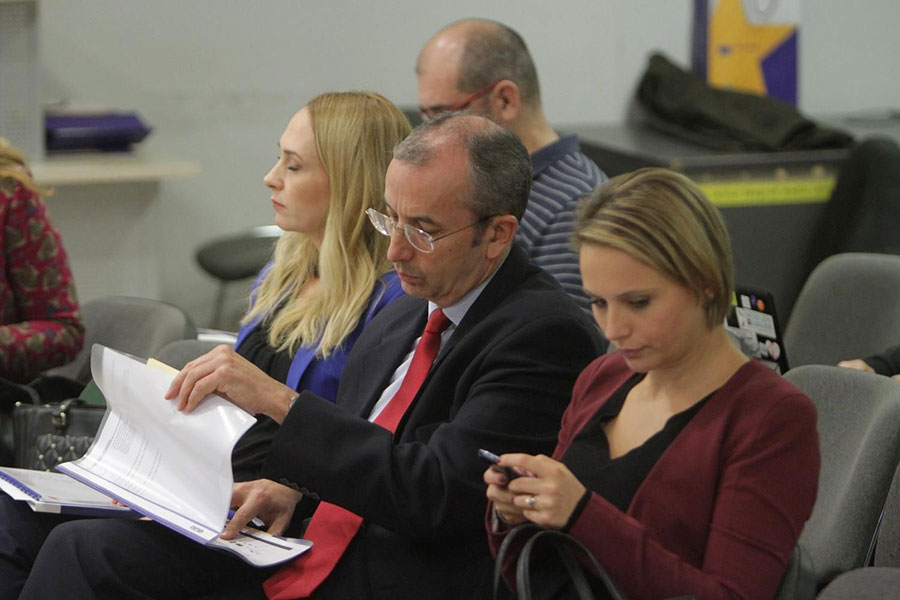New results of the latest opinion poll “Citizens’ Attitudes towards Serbia’s European Integration Process” show that majority of Serbian citizens support Serbia’s membership in the EU and the general attitude towards the EU remains largely stable.
The opinion poll, conducted by TNS Medium Galup on behalf of the EU Delegation to Serbia in the period from 1-7 October 2015, shows that 59 per cent of citizens support Serbia’s membership in the EU. The most common reasons are of economic nature – better future, prosperity (42%), better employment chances (35%), improved living standards (34%). Apart from increased poverty and unemployment rate, the main reasons of those opposing the membership are the loss of national identity and sovereignty, exploitation of natural resources as well as the pressures and conditionality.
Citizens’ attitudes towards the European Union remain stable: 46% of them say that their attitude is “positive, generally speaking”. In the previous opinion poll, conducted in March 2015 for the purposes of EU Delegation as well, this attitude was brought forward by 47% of citizens, whereas in the opinion polls conducted prior to 2014, the support never exceeded 35%.
Should the referendum on Serbia’s EU accession take place, 56% of respondents would vote in favour of, whereas 26% of them would oppose it. The number of citizens who would abstain from the referendum remains similar to March 2015 rate. 70% of citizens show the readiness to vote in referendum.
Majority of citizens (46%) cite the recognition of Kosovo* independence as the main condition for Serbia’s EU membership, followed by implementation of comprehensive reforms (15%), economic stability (12%) and combating corruption and crime (9%). Also, the number of respondents who believe the EU would impose new conditions on Serbia has decreased and now stands at 54% (compared to 59% in March 2015), whereas the number of those who think the EU would impose no new conditions now stands at 35%.

Photo: FoNet
Even though they believe this to be the main condition for membership, 64% of citizens oppose the recognition of Kosovo independence in the interest of EU accession. This attitude remains stable compared to previous years. On the other hand, some 60% of Serbian citizens support the normalisation of relations with Kosovo and Belgrade-Pristina dialogue.
The opinion poll shows that 53% of citizens expect Serbia to become an EU Member State in about 10 years or less, whereas the number of citizens who believe this is not likely to ever happen remains rather stable (14% compared to 15% in March 2015).
Citizens would like to know more about the negotiations with the EU (31%), the political consequences of accession (28%) and its impact on economic situation and living standards (27%).
When asked to name Serbia’s biggest donor, 11% of citizens name the EU, meaning that the EU is considered the third of the biggest donors. However, when they were offered a list of donors and asked to provide the same answer, 28% of citizens thought the EU is the biggest donor, whereas 24% of them believed it was Russia.
The data shows that citizens’ perception on donations largely differs from the real picture: since 2000, the EU has allocated over EUR3 billion of grants out of IPA funds[1] in all areas, from the rule of law, public administration reform and socio-economic development, to environment and agriculture[2].
25% of citizens are familiar with EU donation/assistance programmes. 38% of them are familiar with the EU assistance for refugees and migrants, whereas 25% of them know about the donations for 2014 flood relief. The EU is indeed Serbia’s biggest partner when it comes to flood relief as well as refugee crisis management. The EU has allocated more than EUR173 million in grants for 2014 flood relief, thus helping many families, communities, schools and companies to restore their normal activities[3]. As of September 2015, the EU has been delivering humanitarian aid to Serbia to support in helping refugees and migrants. Also, the EU has adopted a special assistance package for Serbia, worth EUR7 million, whose implementation started in early November. The EU Directorate General for Humanitarian Aid and Civil Protection has allocated additional EUR8.5 million in humanitarian assistance for Serbia and Former Yugoslav Republic of Macedonia[4].
According to 60% of citizens, agriculture holds the number one priority when it comes to European Union assistance, followed by the development of under-developed regions (41%) and health sector (39%).
The opinion poll has been conducted on a sample of 1,247 adult respondents, using the method of “face-to-face” interview.
Download Opinion Poll “Citizens’ Attitude towards Serbia’s European Integration Process” here
Learn more about EU Support for Migrants and Refugees in Serbia here
See the table on EU Assistance for Flood Relief in Serbia here
* This designation is without prejudice to positions on status, and is in line with UNSCR 1244/1999 and the ICJ Opinion on the Kosovo declaration of independence.
[1] Allocated funds. For more information on EU donations, visit www.europa.rs/pomoc-republici-srbiji
[2] For information on successful EU projects, visit www.europa.rs/category/projektne-aktivnosti/najuspeniji-projekti
[3] For more information on EU assistance for flood relief, visit www.europa.rs/tag/poplave-2014
[4] For more information on EU assistance for refugees and migrants, visit www.europa.rs/tag/podrska-eu-za-migrante




